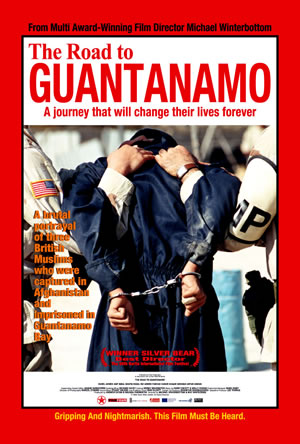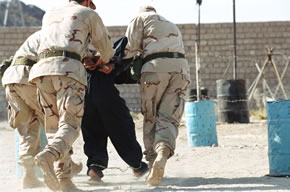|
Genre:
Documentary/Drama
Director: Michael Winterbottom and Mat Whitecross
Starring: Ewan Bailey, Riz Ahmed
RunTime: 1 hr 35 mins
Released By: GV
Rating: NC-16
Watch the trailer
Opening
Day: 22 June 2006
Synopsis
:
The Road to Guantánamo
focuses on the Tipton Three, a trio of British Muslims who
were held in Guantanamo Bay for two years until they were
released without charge.
Movie
Review:
Some movies age well, others don’t. “The Road
to Guantanamo” was highly impressive on first viewing
– a docu-drama of raw grit and understated honesty that
is refreshing in its handling of potentially trite content,
yet I can’t help but wonder, can this purity withstand
the trial of age or will the movie turn out to be manipulative
after multiple viewings? There is no doubting the truth of
what we see but the film is flawed in such a way that makes
it ever so slightly dubious. That aside, this is an exceptional
documentary that will provoke you and stay with you –
even now, images from the film unrelentingly bombard my mind’s
eye. Not because it’s an aggressive tirade (the film
is partisan but stops short of bias) – the astonishing
story is simply too remarkable to forget.
The
basis of “The Road to Guantanamo” is the well-documented
story of the Tipton Three, a group of three British Muslims
(Asif, Ruhal and Shafiq) who were held in Guantanamo Bay for
two years until they were released without charge in 2004.
The group of childhood friends from the Midlands town of Tipton
had traveled to Pakistan in September 2001 for Asif’s
arranged wedding and while there decided to cross the border
to Afghanistan. The specific reasons for their trip are vaguely
revealed but the general impression is these boys were simply
caught in the wrong place at the wrong time. As the Taliban
rapidly lose control to the Northern Alliance, the boys are
rounded up as prisoners alongside hundreds of other seeming
innocents. They are transported and held under inhumane conditions,
where the goal is hardly to transport or hold but to conveniently
reduce the number of prisoners alive either by piling them
in ill-ventilated container trucks where hundreds suffocate
or starving them with minimal food. The trio’s terrible
ordeal continues as we witness them getting shuffled around
in a series of confusing scenes before they’re shipped
to Cuba by the American troops, classified as criminals associated
with the Taliban.
The
second and by far more superior half of the film concentrates
on the three men’s ordeal at Camp X-Ray in Guantanamo
Bay, where they suffer unspeakable indignities under the American
troops guarding them. They are forced to kneel in the scorching
sun and to sleep in the stinging wind then woken every hour
for a head-count – and these are just the tip of the
iceberg. The sublime execution of the story induces a disturbing
satisfaction in the viewer: a perplexing mixture of horror
and excitement at the unraveling scenes, then, the intense
guilt of a voyeur who sits lamely, shame-faced for looking,
but continues riveted all the same. This is one of those powerful
films that assails you with information and commands your
attention, but unlike the volatile nature of most political
films, “The Road to Guantanamo” remarkably maintains
an even composure throughout. Simply said, the assailing and
commanding are all done gently, but in no way lack oomph.
Indeed
the film, to its immense credit, has tackled an important
issue (the US government’s insistence on detaining without
trial) without the pomp and circumstance of a high-budget
blockbuster, neither is it the self-righteous guilt-trip I
was afraid it might be. Directors Michael Winterbottom and
Mat Whitecross wisely allow the extraordinary story to take
over the production entirely; their only ostensible interference
is the use of footage from actual interviews conducted with
the trio. These are interspersed with reenactments of their
harrowing account, acted out by first-time actors who lend
an organic tension to the film. But the most outstanding part
of the film is its sardonic humour; moments where the protagonists
cheekily reveal hints of personality are charming, and make
this hard-hitting film that much easier to enjoy.
There
seems to be a conscious effort to contain the explosive story
and keep it grounded. Most of this works as the torture scenes
work to greater effect when they are not belaboured. Yet parts
of this excellent film feel choked, such as the ones of the
men feebly defending themselves during their ridiculous interrogations.
In addition there is the double-edged sword of using amateur
actors: their performances score in realism but lack the texture
of pent-up desperation and mental despair. My biggest concern
remains with the first half -the weaker link- where details
are murky and the editing untidy.
Perhaps
a second viewing will uncover details that trounce these complaints
– if so, “The Road to Guantanamo” would
have aged well, turning a good movie into a great one. Meanwhile,
there is no denying that, in a movie that packs some nasty
punches, its first blow delivers.
Movie
Rating:
   
(One of the most revealing movies I’ve seen, and a lesson
in how to make a solid political movie without resorting to
ostentatious diatribes)
Review
by Angeline Chui
|



